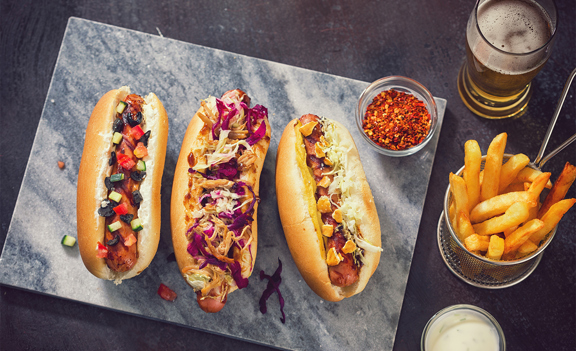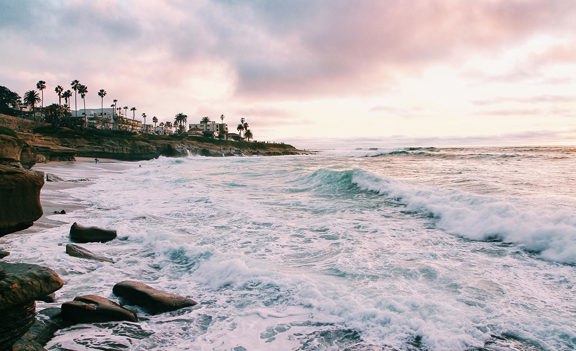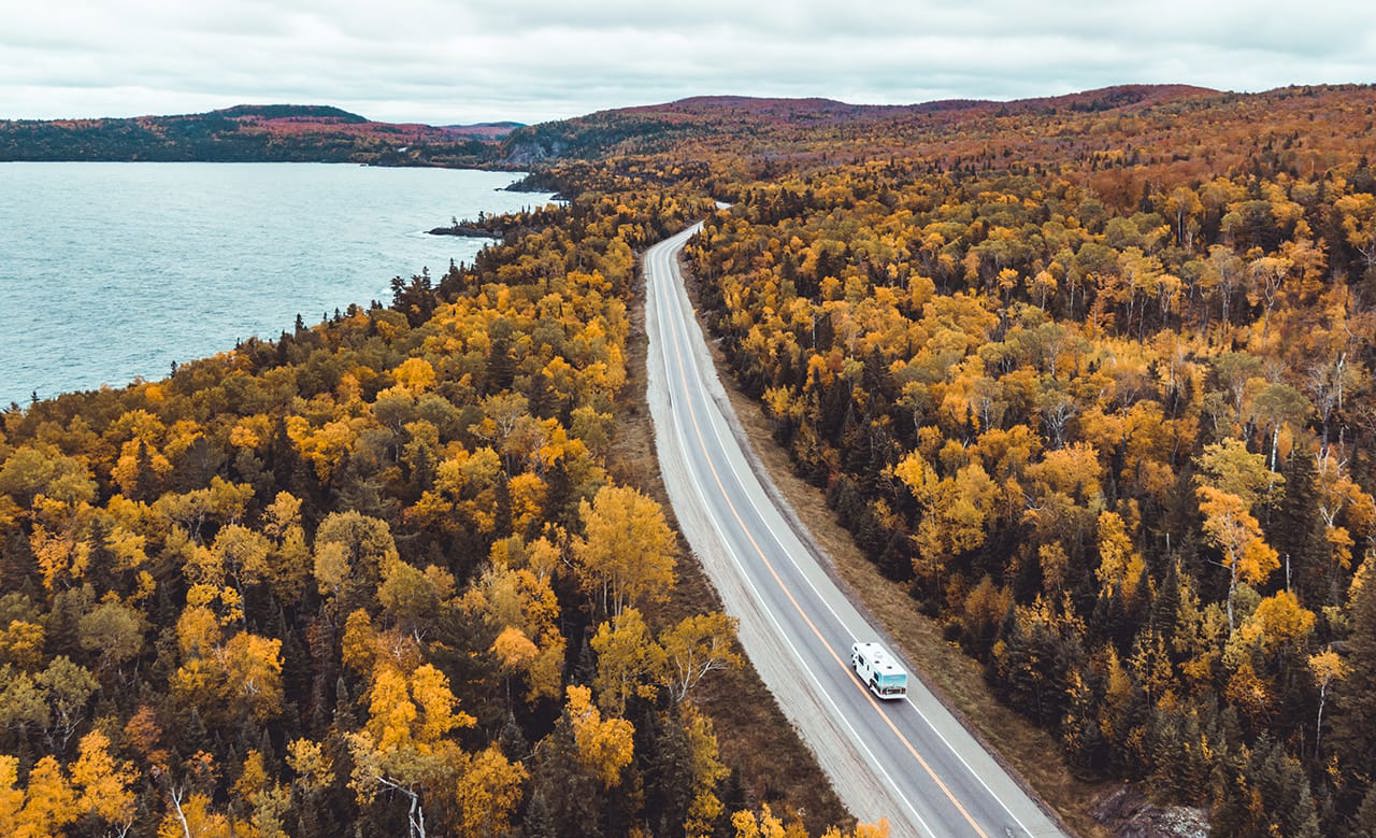
Road Trip Safety Tips For Families, Couples, & Individuals
- Family Friendly
- Road Trip
A road trip is one of the most exciting ways to explore new destinations, offering the freedom to set your own pace and discover hidden gems along the way. But with that freedom comes responsibility—the safety of your passengers, your vehicle, and yourself should always come first. That’s why following the right road trip safety tips can make all the difference between a smooth journey and unexpected setbacks.
Whether you’re hitting the road as a family with children in the back seat, a couple looking for adventure, or an individual seeking solitude and exploration, having a solid safety plan is essential. Most people think about packing snacks and playlists, but forget that things like checking your tires, monitoring fluid levels, and preparing an emergency kit are just as important.
Today’s roads can present challenges that didn’t exist a decade ago. Heavy traffic, distracted drivers using a cell phone or mobile device, and sudden changes in road conditions all add layers of risk to any trip. Add to that the strain of long hours behind the wheel, unpredictable weather, and the possibility of car troubles, and you can see why preparation is key. A little planning now—like making sure your gas tank is never close to empty or carrying jumper cables—can prevent major headaches later.
In this guide, we’ll cover essential safety tips for every type of traveler—from vehicle preparation and fuel planning to social media awareness and trusting your instincts. You’ll also learn how to handle common challenges like breakdowns, route changes, and staying energized on a long drive. With the right approach, you can stay alert, drive safely, and fully enjoy the journey ahead.
Cruise America makes it easier to travel securely. Each RV is thoroughly inspected, equipped with safety-focused features, and backed by reliable roadside assistance, giving you peace of mind no matter where the road takes you.
Essential Road Trip Safety Tips Before You Hit the Road
Before starting any long road trip, it’s important to make sure your vehicle is ready for the miles ahead. A little planning before departure can save you from unexpected car troubles and costly repairs along the way. Here are some key safety tips to cover:
1. Inspect Your Tires
Check tire pressure, tread depth, and overall wear. Low pressure or worn-out tires can cause blowouts, especially on highways or in hot weather. Don’t forget to check the spare, and make sure you know where the jack is located.
2. Monitor Fluid Levels
Your vehicle’s fluid levels are critical for safe driving. Double-check the oil, coolant, windshield washer fluid, and brake fluid before you leave. Keeping these topped up helps your system run smoothly and prevents overheating in high-temperature conditions.
3. Test Your Battery and Brakes
A weak battery or worn brakes can quickly turn a fun trip into a stressful situation. Have a mechanic run a quick test if you’re unsure about the condition of these parts.
4. Pack an Emergency Kit
Every traveler should carry an emergency kit tailored for the road. At a minimum, include:
-
Jumper cables
-
First aid supplies
-
Flashlight and extra batteries
-
Drinking water and snacks
-
Phone charger for your cell phone or mobile device
Having these items on hand reduces the risk of being stranded if you run into trouble.
5. Review Your Owner’s Manual
Most people overlook it, but your owner’s manual contains important information about your vehicle—from how to change a flat to understanding dashboard warning lights. Keep it within reach of the driver’s seat in case you need to reference it mid-journey.
Cruise America makes preparation easier. Every RV is inspected before pickup, and renters can rely on included roadside assistance for added peace of mind. With a few preventive steps, you’ll start your trip feeling confident and ready for the adventure ahead.
Planning the Perfect Road Trip for Every Type of Traveler
A safe and enjoyable road trip begins with smart planning. Taking time to map out your route, anticipate road conditions, and schedule regular breaks can make a huge difference. A little foresight helps ensure your trip goes smoothly, whether you’re traveling with children, your partner, or on your own.
Families
When traveling with kids, planning is everything. Drivers should schedule frequent stops at rest areas, playgrounds, or scenic spots so children can stretch their legs and burn off energy. Pack snacks, games, and activities to keep the back seat calm and distraction-free. Don’t forget to bring proper car seats or boosters for younger children, and always secure them correctly before hitting the road.
Couples
Couples can make the most of their journey by dividing responsibilities. One person can handle navigation and directions, while the other focuses on driving. Switching drivers regularly reduces fatigue and helps both partners stay alert. Build flexibility into your plan so you can make spontaneous stops at interesting attractions without feeling rushed.
Solo Travelers
For solo adventurers, safety often means staying connected. Share your route and daily plans with friends or family, and check in by cell phone or text whenever possible. Avoid overly isolated stops at night, and always park in well-lit, visible areas. Keep your mobile device charged so you can access maps, weather updates, and emergency contacts if needed. Remember: safe driving is easier when you’re rested and confident in your vehicle.
By tailoring your plan to your travel style, you’ll reduce risk and make the most of every mile. No matter who you’re traveling with, Cruise America RVs provide the comfort and security to help your trip run smoothly.
Don’t Let Your Gas Tank Get Too Low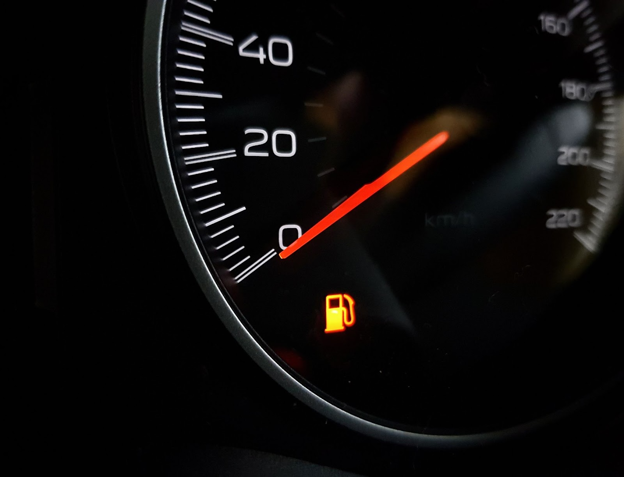
Running out of fuel is one of the most avoidable issues on any road trip, yet it still happens to drivers more often than you might think. Keeping your gas tank at least half full is a simple but critical safety step, especially when traveling through rural areas or unfamiliar stretches of road.
Why It Matters
For cars and RVs alike, a low tank can leave you stranded far from the nearest gas station. In an RV, the stakes are even higher: a heavier vehicle requires more fuel, and refueling options can be more limited than for smaller cars or SUVs. Plus, running on low fuel can put unnecessary strain on your system and increase the risk of mechanical issues.
Smart Fuel Planning
-
Use apps or your cell phone GPS to locate nearby gas stations along your route.
-
In areas with fewer services, plan to fill up whenever your tank dips below half rather than waiting for the warning light.
-
Remember that traffic jams, detours, or sudden changes in road conditions can eat up more fuel than expected.
Extra Safety Tips
When pulling into a gas station, park where you can easily maneuver your RV in and out without tight turns. Double-check the clearance at the pump canopy if you’re driving a larger rig. Always turn off the vehicle completely before refueling for safety.
Staying mindful of your gas tank is one of those small but powerful road trip safety tips that ensures you keep moving forward. Cruise America RVs are designed for long hauls, but a little fuel awareness helps keep your journey worry-free.
Everyday Safety Tips While On the Road
Even with careful planning, the most important part of a road trip is how you handle yourself once you’re actually driving. Practicing good habits every day can reduce the risk of accidents, keep passengers safe, and help your vehicle last longer on the journey.
Buckle Up and Secure the Back Seat
Everyone should wear a seat belt at all times—no exceptions. Make sure children are in the right car seats or boosters, and always secure luggage or gear so it doesn’t shift while you drive. Loose items can become dangerous projectiles if you need to brake suddenly.
Defensive Driving and Awareness
Stay mindful of surrounding drivers, trucks, and changing road conditions. Keep extra distance between your vehicle and the one in front of you, especially in heavy traffic or bad weather. Practicing defensive habits is one of the most effective safety tips for avoiding accidents.
Manage Fatigue and Night Driving
Driving tired can be as dangerous as driving impaired. On long trips, schedule regular breaks so everyone can stretch and eat. Avoid pushing yourself for too many hours at once, and switch drivers often if possible. At night, adjust your headlights for visibility and reduce speed in case of unexpected obstacles.
Keep Your Vehicle Maintained on the Go
Check your tires, brakes, and fluid levels regularly, especially if you notice unusual noises or handling issues. A quick check can prevent small problems from turning into expensive repairs. If you’re unsure, consult your owner’s manual or stop by a mechanic to stay ahead of potential issues.
Parking and Security
Whenever possible, choose well-lit areas for parking. Avoid isolated rest stops late at night, and always lock your vehicle when leaving it unattended. Simple habits like this control who has access to your RV and reduce the chance of theft or vandalism.
By following these everyday road trip safety tips, you’ll keep yourself and your passengers protected while enjoying the adventure. Cruise America RVs are built with families, couples, and solo travelers in mind, giving you both comfort and peace of mind on the road.
Stay Alert and Aware During Your Road Trip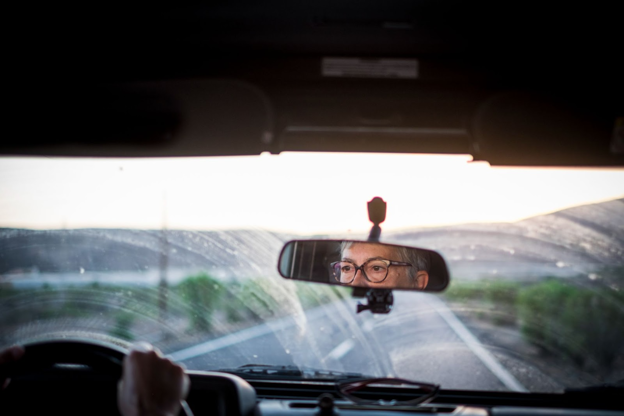
One of the most important aspects of safe driving is maintaining awareness behind the wheel. Fatigue, distraction, or overconfidence can quickly turn a fun trip into a dangerous situation. Staying sharp helps you respond to sudden changes in road conditions, other drivers, or unexpected traffic.
Avoid Distracted Driving
Keep your focus on the road at all times. Using a cell phone, adjusting a mobile device, or even eating while you drive pulls your attention away. Encourage passengers to handle music, directions, or snacks so you can stay focused.
Stay Energized
On long journeys, plan for regular breaks every few hours. Get out, stretch, hydrate, and eat something light to keep your energy stable. This helps you stay alert and keeps your reaction times sharp.
Couples: Share the Responsibility
When traveling as a pair, switch drivers frequently to avoid fatigue. One can monitor maps, weather, and navigation while the other focuses fully on driving. This teamwork makes for smoother, safer travel.
Solo Travelers: Rest and Recharge
If you’re traveling alone, it’s tempting to push through, but that increases risk. Schedule rest periods, avoid driving late into the night, and forget the idea that you need to cover maximum miles every day. A well-rested driver is a safe driver.
Families: Keep the Back Seat Calm
Parents know that restless children in the back seat can be one of the biggest distractions. Bring games, audiobooks, or activities so kids stay entertained and you can keep your attention where it belongs—on the road ahead.
By making conscious choices to stay alert and reduce distractions, you’ll improve your ability to drive safely and handle whatever the journey throws at you. Cruise America RVs provide comfort for both drivers and passengers, helping everyone remain refreshed and secure.
Social Media Safety on the Road
In today’s world, sharing photos and updates online is second nature during a road trip. But oversharing in real time can put you at unnecessary risk. Broadcasting your exact location while traveling may alert strangers that your vehicle is unattended, or even give people clues about your route and schedule.
Delay Your Posts
One of the simplest safety tips is to post updates after you’ve left a gas station, restaurant, or attraction. By waiting a few hours before sharing, you keep your journey memories intact without compromising your safety.
Families: Teach Teens Safe Posting Habits
Children and teens often want to show off their adventures from the back seat. Take time to talk with them about online safety and why it’s better to delay posting. Encourage them to use private group chats with friends instead of public platforms.
Couples: Keep It Between You
Couples can create private shared albums or secure group chats to document their trip together. This keeps loved ones updated without revealing too much to outsiders.
Solo Travelers: Stay Connected, Not Exposed
For individuals traveling alone, social media can be a double-edged sword. Use your cell phone or mobile device to check in with trusted contacts directly rather than posting publicly. If you need to share your directions or location, do so privately.
Remember, your photos and posts will be just as enjoyable when you share them later. Practicing good social media habits is one of the most modern and overlooked road trip safety tips—and it helps ensure your memories are about the adventure, not avoidable setbacks.
Trust Your Gut in Any Situation
When you’re on a road trip, one of the most valuable tools you have is your intuition. If something feels off—whether it’s a dark rest area, a pushy stranger, or a suspicious gas station—don’t ignore that instinct. Most people regret the times they brushed off their gut feelings, not the times they took extra precautions.
Why It Matters
Even the best plan can’t predict every situation. Unfamiliar road conditions, strange drivers, or unexpected sudden changes in your surroundings can create uncertainty. Trusting your instincts helps you act quickly to reduce risk.
Families: Teach Children Awareness
Help your children understand the importance of speaking up if they feel uncomfortable. Whether it’s about someone approaching the back seat or a location that seems unsafe, reinforce that their feelings matter. Parents should also model this by making cautious choices openly so kids learn from example.
Couples: Trust Each Other’s Input
Traveling as a pair means leaning on one another. If one partner feels uneasy about a stop, forget the idea of pushing through—adjust your route or plan together. Validating each other’s concerns keeps the journey safer and strengthens trust.
Solo Travelers: Listen Closely to Yourself
When traveling alone, you don’t have someone else to confirm your feelings. That’s why it’s even more important to pay attention to your instincts. Avoid isolated stops at night, double-check locks before sleeping in your RV or car, and keep your cell phone or mobile device nearby in case you need help.
Staying alert to your surroundings and listening to your instincts are underrated but essential road trip safety tips. Cruise America RVs are designed with your protection in mind, giving you the confidence to follow your gut and keep moving toward the adventure ahead.
Fighting Human Nature to Be Trusting
On a road trip, it’s natural to want to believe the best in people. Many of us are wired to be helpful, but unfortunately, not everyone has good intentions. Strangers may approach when your vehicle is parked at a gas station, rest stop, or even while you’re checking your tires. It’s important to balance kindness with caution to reduce your risk.
Why It’s Hard
Most people feel uncomfortable saying no, especially when someone asks for help. But during travel, protecting your passengers, your belongings, and your vehicle must come first. Even a simple distraction can lead to theft or unwanted access.
Families: Prepare Children Ahead of Time
Parents should teach children that not all strangers are safe. Practice “safe scripts” so kids know how to respond if approached in the back seat or parking lot. Let them see you model how to politely decline requests that don’t feel right.
Couples: Trust Each Other’s Boundaries
When traveling as a pair, listen to each other if something seems off. If one person feels uncomfortable, it’s better to move on than argue about whether it’s safe. Couples should agree on a shared plan for how to handle strangers approaching the vehicle.
Solo Travelers: Give Yourself Permission to Say No
Traveling alone sometimes means extra pressure to be agreeable. Remember, it’s okay to refuse help, stay inside your car, or drive away if something feels wrong. Carrying an emergency kit and knowing how to handle minor car troubles—like using jumper cables or topping off fluid levels—reduces dependence on strangers.
Staying polite but cautious is one of the smartest road trip safety tips. Trust is valuable, but when you’re on the road, safety should always outweigh the desire to help.
Common Tricks Strangers Use on the Road
While most encounters on a road trip are harmless, it’s smart to know the tactics some people use to take advantage of travelers. Awareness helps you stay alert, protect your vehicle, and keep your trip safe.
Fake Emergencies
One of the most common tricks is someone asking for help with car troubles—like a dead battery, flat tires, or needing gas money. While genuine emergencies do happen, approach with caution. Offer to call roadside assistance or provide directions to the nearest gas station instead of getting directly involved.
Distraction Scams
In parking lots or rest areas, one person may strike up a conversation while another tries to gain access to your back seat or belongings. Always lock your vehicle, even if you’re only stepping away for a moment, and double-check that windows are closed.
Too-Good-to-Be-True Offers
From “free gifts” at a gas station to pushy sales pitches, scams often rely on catching you off guard. Trust your instincts—if it feels off, walk away.
Aggressive Approaches
Some scammers may pressure you to hand over money or talk you into following them to another location. Remember: you don’t owe anyone your time, and keeping control of the situation means prioritizing your safety.
How to Protect Yourself
-
Park in well-lit areas.
-
Keep valuables out of sight.
-
Carry an emergency kit so you’re less reliant on strangers.
-
Rely on your owner’s manual and Cruise America’s built-in roadside assistance for help.
Recognizing these tricks and being prepared to say no are simple but powerful safety tips. By staying cautious, you’ll minimize risk and keep your journey focused on the adventure ahead.
Cruise America’s Commitment to Road Trip Safety

At Cruise America, we know that safety is the foundation of every memorable road trip. That’s why every RV rental undergoes a detailed inspection before your journey begins. From checking fluid levels, brakes, and tires to ensuring the battery and coolant system are in top condition, our team makes sure your vehicle is road-ready.
Our goal is simple: help you drive confidently, stay alert, and focus on the fun of the trip while we handle the heavy lifting on maintenance and safety. With Cruise America, you don’t just rent an RV—you gain a trusted partner for a safe, unforgettable adventure.
Travel Safely With Cruise America
A successful road trip isn’t just about the destinations you visit—it’s about getting there safely and enjoying the entire journey -- and we're here to help make it happen. Book your next RV trip with Cruise America today and experience the peace of mind that comes from knowing you’re prepared for whatever the road has in store.

